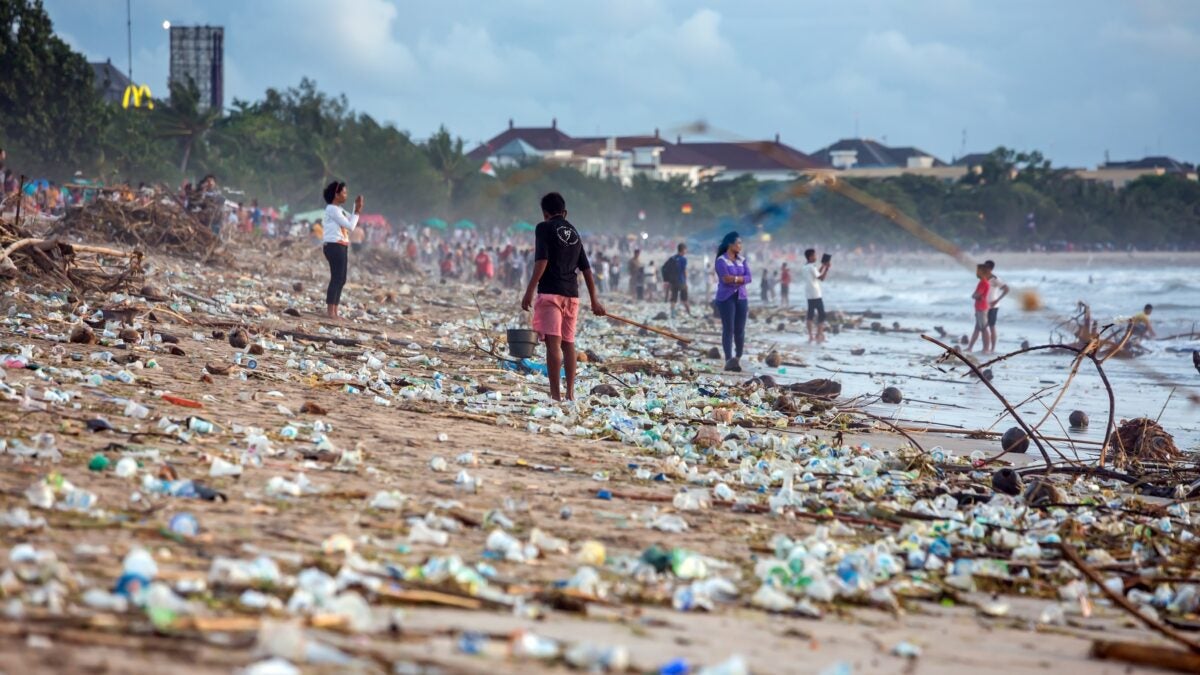Single-use plastic could be on its way out. During the Fifth UN Environment Assembly (UNEA) on Wednesday, 175 nations endorsed a resolution to end plastic pollution.
The UNEA aims to create an international, legally binding agreement that includes production, design and disposal of plastic. The agreement, to be drafted by the end of 2024, will include alternatives to single-use plastics, such as designing reusable and recyclable products, improving collaboration to access technology, and building capacity and scientific collaboration.
About 2 million metric tons of plastic were produced in 1950, according to UNEA. That skyrocketed over the years to 348 million tons in 2017. Capacity to produce plastic is predicted to double by 2040 if preventative actions are not taken.
Currently, only 9% of plastic created globally is recycled, according to the Organization for Economic Co-operation and Development, leaving 91% of plastic waste headed for landfills or to waterways that eventually lead to the ocean.
Container shipping company CMA CGM recently committed to stop transporting plastic waste overseas by June, at least partly because the countries it ships plastic to do not have proper recycling facilities.
“Today marks a triumph by planet earth over single-use plastics. This is the most significant environmental multilateral deal since the Paris accord. It is an insurance policy for this generation and future ones, so they may live with plastic and not be doomed by it,” Inger Andersen, executive director of UNEP, said in a release.
She said that looking at plastic’s entire life cycle is the only way to make meaningful progress. The draft resolution highlighted the importance of “promoting sustainable design of products and materials so that they can be reused, remanufactured or recycled and therefore retained in the economy for as long as possible.”
According to UNEA, shifting to a circular economy for plastics could:
- Reduce plastic waste entering the oceans by 80% by 2040. Currently, about 11 million metric tons of plastic flows into the ocean every year.
- Save governments $70 billion by 2040.
- Reduce virgin plastic production by 55%.
- Create 700,000 jobs, largely in the global South.
- Reduce greenhouse gas emissions by 25%.
Read: World Oceans Day offers a reminder about the plastic problem
Andersen said that focusing on circularity for plastics and creating a reusable supply chain model could transfer over to other sectors, such as energy, transport and construction.
Plastics can negatively impact human health, especially if they are burned. They also invade ecosystems and harm marine life.
More than 800 marine and coastal species are affected by marine debris such as plastic straws, plastic rings, large plastics and microplastics through habitat impacts, ingestion or entanglement.
“Today, no area on the planet is left untouched by plastic pollution, from deep-sea sediment to Mount Everest. The planet deserves a multilateral solution that speaks from source to sea. A legally binding global agreement on plastic pollution will be a truly welcome first step,” Amina J. Mohammed, deputy secretary-general of the U.N., said in a release.
Click here for more FreightWaves articles by Alyssa Sporrer.
Related Stories:
Report: Climate change ‘creating shocks to global trade’
PepsiCo gets A for net-zero emissions efforts
HowGood adds procurement module to sustainability database
Plastics Express bringing jobs, port business to Houston area












Amberbock Mike
This pollution occurs in the the third world Asia Pacific and is NOT THE RESULT of U.S Citizen actions. Why should we pay for it? If one cares about this trash they should demand that China stop this pollution and clean up the mess. The world won’t demand this and China will not do it. I hope the dolphins and tuna evolve to digest plastic because the third world does not care.